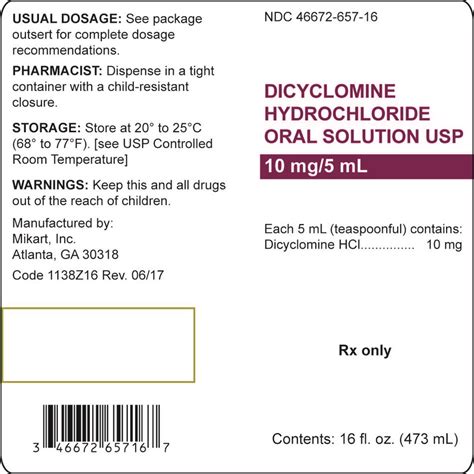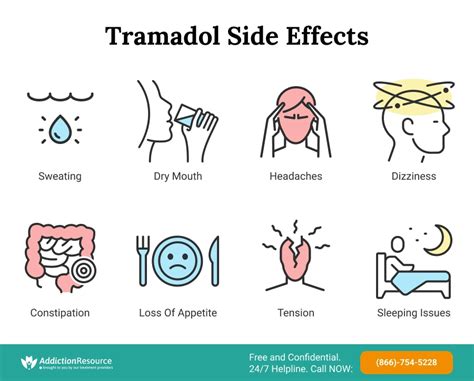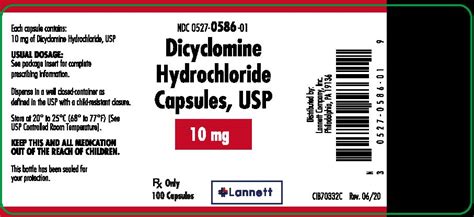Intro
Dicyclomine side effects include drowsiness, dry mouth, and constipation, with rare cases of urinary retention, blurred vision, and tachycardia, affecting digestive health and nervous system function.
The importance of understanding the side effects of medications cannot be overstated, especially when it comes to drugs like dicyclomine, which is commonly used to treat gastrointestinal disorders. Dicyclomine is an anticholinergic medication that helps relieve spasms of the stomach and intestines, but like all medications, it can have unwanted effects on the body. As consumers of healthcare, it is crucial to be informed about the potential side effects of dicyclomine to ensure safe and effective treatment. This knowledge enables patients to recognize adverse reactions early, manage them appropriately, and make informed decisions about their healthcare.
Dicyclomine's mechanism of action involves blocking the action of a neurotransmitter called acetylcholine, which plays a key role in the contraction and relaxation of smooth muscle in the gastrointestinal tract. By inhibiting this neurotransmitter, dicyclomine helps to reduce muscle spasms and alleviate symptoms associated with conditions like irritable bowel syndrome (IBS). However, the anticholinergic properties of dicyclomine can also affect other parts of the body, leading to a range of potential side effects. Understanding these side effects is vital for patients who are considering dicyclomine as a treatment option, as well as for healthcare providers who need to monitor their patients' responses to the medication.
The management of gastrointestinal disorders often requires a comprehensive approach that takes into account the potential benefits and risks of different treatments. For patients who are prescribed dicyclomine, being aware of the possible side effects can help them navigate their treatment plan more effectively. This includes recognizing when to seek medical attention if adverse reactions occur and knowing how to mitigate mild side effects to improve their quality of life. As the healthcare landscape continues to evolve, patient education and empowerment play increasingly critical roles in ensuring that treatments are both safe and effective.
Dicyclomine Side Effects Overview

Dicyclomine can cause a variety of side effects, ranging from mild and temporary to severe and potentially serious. Common side effects include dry mouth, dizziness, blurred vision, and constipation. These effects are generally related to the anticholinergic activity of the drug and are often manageable with lifestyle adjustments or, in some cases, additional medications. However, it's essential for patients to discuss any side effects they experience with their healthcare provider to determine the best course of action.
Common Side Effects of Dicyclomine
Some of the most frequently reported side effects of dicyclomine include: - Dry mouth - Dizziness or lightheadedness - Blurred vision - Constipation - Nausea or vomiting - Headache - Drowsiness - Confusion or disorientation (more common in the elderly) These side effects are typically dose-dependent, meaning that higher doses of dicyclomine are associated with a greater risk of experiencing them.Severe Side Effects of Dicyclomine

While less common, dicyclomine can also cause severe side effects that require immediate medical attention. These include:
- Allergic reactions, such as hives, itching, swelling, or difficulty breathing
- Severe constipation that leads to bowel obstruction
- Urinary retention
- Confusion, especially in elderly patients, which can be a sign of anticholinergic toxicity
- Rapid or irregular heartbeat
- High blood pressure
- Seizures (in rare cases)
Managing Side Effects of Dicyclomine
For patients experiencing side effects from dicyclomine, there are several strategies that can help manage these adverse reactions. These include: - Staying hydrated to combat dry mouth and constipation - Avoiding driving or operating heavy machinery if dizziness or drowsiness occurs - Using eye drops for dry eyes - Engaging in physical activity to help prevent constipation - Eating small, frequent meals to manage nausea - Avoiding alcohol and other drugs that can exacerbate side effectsDicyclomine Interactions

Dicyclomine can interact with other medications, either by enhancing their effects or increasing the risk of side effects. It's crucial for patients to inform their healthcare provider about all the medications they are taking, including over-the-counter drugs and supplements, to minimize the risk of adverse interactions. Some medications that can interact with dicyclomine include:
- Antihistamines
- Decongestants
- Muscle relaxants
- Sleep aids
- Certain antidepressants
- Medications for Parkinson's disease
Special Precautions with Dicyclomine
Certain patient populations may require special precautions when taking dicyclomine. These include: - Elderly patients, who are more susceptible to the anticholinergic effects of dicyclomine - Children, as safety and efficacy in pediatric populations may not be well established - Pregnant or breastfeeding women, as the potential risks to the fetus or baby are not fully understood - Patients with certain medical conditions, such as glaucoma, myasthenia gravis, or gastrointestinal obstructionDicyclomine Overdose

An overdose of dicyclomine can lead to severe anticholinergic toxicity, characterized by symptoms such as:
- Dilated pupils
- Flushing
- Dry skin
- Fever
- Hallucinations
- Confusion
- Seizures
- Coma
Treatment of Dicyclomine Overdose
If an overdose is suspected, it is essential to seek medical help immediately. Treatment may involve supportive care to manage symptoms, as well as the administration of medications to counteract the anticholinergic effects of dicyclomine.Conclusion and Next Steps

In conclusion, while dicyclomine can be an effective treatment for gastrointestinal disorders, it is crucial for patients to be aware of the potential side effects and take steps to manage them. By understanding the risks and benefits associated with dicyclomine, patients can work closely with their healthcare providers to develop a treatment plan that is tailored to their needs and minimizes the risk of adverse reactions.
We invite readers to share their experiences or questions about dicyclomine and its side effects in the comments below. Your input can help others who may be considering this medication or are currently undergoing treatment. Additionally, if you found this article informative, please consider sharing it with others who might benefit from this information.
What are the most common side effects of dicyclomine?
+The most common side effects of dicyclomine include dry mouth, dizziness, blurred vision, constipation, nausea, headache, and drowsiness.
Can dicyclomine cause severe side effects?
+Yes, dicyclomine can cause severe side effects, including allergic reactions, severe constipation, urinary retention, confusion, and seizures. It is essential to seek medical help immediately if any of these symptoms occur.
How can I manage the side effects of dicyclomine?
+Side effects of dicyclomine can be managed by staying hydrated, avoiding driving or operating heavy machinery if dizziness occurs, using eye drops for dry eyes, engaging in physical activity to prevent constipation, and eating small, frequent meals to manage nausea.
